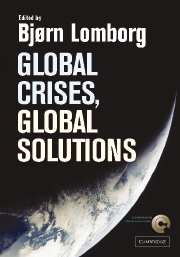Book contents
- Frontmatter
- Contents
- List of figures
- List of tables
- List of boxes
- List of contributors
- Acknowledgements
- List of abbreviations and acronyms
- Introduction
- PART I THE CHALLENGES
- 1 Climate change
- 2 Communicable diseases
- 3 Conflicts
- 4 Access to education
- 5 Financial instability
- 6 Governance and corruption
- 7 Malnutrition and hunger
- 8 Migration
- 9 Sanitation and access to clean water
- 10 Subsidies and trade barriers
- PART II RANKING THE OPPORTUNITIES
10 - Subsidies and trade barriers
Published online by Cambridge University Press: 22 September 2009
- Frontmatter
- Contents
- List of figures
- List of tables
- List of boxes
- List of contributors
- Acknowledgements
- List of abbreviations and acronyms
- Introduction
- PART I THE CHALLENGES
- 1 Climate change
- 2 Communicable diseases
- 3 Conflicts
- 4 Access to education
- 5 Financial instability
- 6 Governance and corruption
- 7 Malnutrition and hunger
- 8 Migration
- 9 Sanitation and access to clean water
- 10 Subsidies and trade barriers
- PART II RANKING THE OPPORTUNITIES
Summary
The Copenhagen Consensus project is looking for an answer to the question: if there was a desire to spend US$50 bn over the next five years to improve the world, what opportunity offers the highest pay-off? This chapter argues that putting effort into phasing out wasteful subsidies and trade barriers should be ranked highly among the opportunities being addressed in this project, for three reasons:
It would require only a small fraction of that $50 bn to make a significant impact in this area, via greater advocacy, and cuts to subsidies could reduce government outlays by hundreds of millions of dollars leaving plenty to spend on the next-best opportunity too
Trade reform would allow citizens to spend more also on other pressing problems (because under freer trade the world's resources would be allocated more efficiently), thereby indirectly contributing to opportunities to alleviate other challenges
Trade reform would also directly alleviate poverty and thereby reduce environmental degradation and address some of the other challenges identified in this project, namely climate change, communicable diseases, conflicts and arms proliferation, education underinvestment, financial instability, poor governance and corruption, population and migration issues, water issues, and undernutrition and hunger.
The Challenge
Despite the net economic and social benefits of reducing most government subsidies and opening economies to trade, almost every national government intervenes in markets for goods and services in ways that distort international commerce.
- Type
- Chapter
- Information
- Global Crises, Global Solutions , pp. 541 - 602Publisher: Cambridge University PressPrint publication year: 2004
- 7
- Cited by



